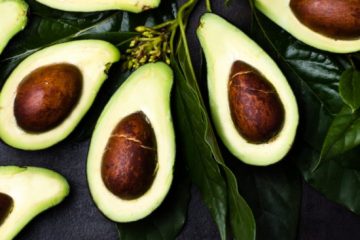If you are looking for boundless energy, weight loss, and mental clarity (and who isn’t?), putting chunks of butter and a healthy splash of MCT oil into your morning cup of coffee might just be the perfect prescription.
MCT oil is gaining popularity among keto enthusiasts due to its ability to quickly convert into fuel, boost metabolism, satisfy hunger, and help you burn body fat. MCT oil does not have to go through digestion to transform into energy. Instead, it heads straight to the liver where it converts into ketones and provides needed energy without being stored in the body. You could say MCT oil is the perfect ketogenic food!
But what exactly is MCT oil, and how do you use it?
What is MCT Oil
MCT is short for medium-chain triglycerides. A triglyceride is a type of fatty acid that is composed of a glycerol spine and three fatty acids. The fatty acids vary in length based on the number of carbon atoms in their hydrocarbon chains. Medium-chain triglycerides are considered medium chain fatty acids (MCFAs) because they have just 6-12 carbon atoms. (Learn more about short-, medium-, and long-chain fatty acids and the best fats to eat on the Keto Diet.)
MCTs occur naturally in varying amounts in many foods, such as butter, hard cheese, whole milk, full-fat yogurt, palm kernel oil, and—perhaps most famously—coconut oil. But most foods have a greater amount of long-chain fatty acids (LCFAs) than MCFAs. Even coconut oil, which is famous for its high concentration of MCTs, only contains about 87% MCTs. Through an extraction process, the medium chain triglycerides found in coconut oil are isolated to make MCT oil, which contains 100% MCFAs.
How is MCT Oil Different than Coconut Oil
Coconut oil is made up of several different types of saturated fatty acids (88.5%), some monounsaturated fatty acids (6.5%), and some polyunsaturated fatty acids (5%)[1]. The fatty acids in coconut oil are a mostly medium chain fatty acids, with some long chain fatty acids mixed in:
- 49% lauric acid (C12)
- 20% myristic acid (C14)
- 8% palmitic acid (C16)
- 7% caprylic acid (C8)
- 5% capric acid (C10)
- 3% stearic acid (C18)
MCT oil is extracted from coconut oil, and contains only medium chain triglycerides. Typically, high quality MCT oil is made up of 100% caprylic acid or 100% capric acid or a combination of the two. Some lower quality MCT oils may contain caproic acid or lauric acid. If you experience stomach upset or itchy throat, it might be worth getting another brand with higher purity standards.
The Major Types of MTCs
Caproic acid (C6)
Caproic is the shortest of the MCTs and filtered out of MCT oils. It is worth mentioning as this oil may cause a burning sensation in the back of your throat, gastrointestinal issues, or diarrhea.
Caprylic acid (C8)
Caprylic acid is the fastest MCT to metabolize into energy. This fatty acid is the most ketogenic MCT, and promotes gut health through its anti-microbial attributes.[2]
Capric acid (C10)
Capric acid is similarly ketogenic as caprylic acid, but it has a slower transformation into cellular energy.
Lauric acid (C12)
Although lauric acid only has 12 carbon atoms, it is not considered an MCT as it behaves more like a long chain triglyceride (LCT). Lauric acid may, however, be beneficial to intestinal health and have anti-fungal properties.
So why would you want to add pure MCT oil to your diet?
Health Benefits of MCT Oil
There are many health claims surrounding daily consumption of MCT oil. You have probably heard people mention that MCT oil helps them:
- feel fuller longer
- not fell hungry
- not crave sweets
- have more energy and eliminate that afternoon slump
- have better mental focus and clarity
So how exactly does MCT oil give you more energy and suppress hunger?
The increase in energy is due to the way the body processes MCT. The medium chain structure is key to easier digestion. The medium chain breaks down very easily, and does not have to go through digestion to convert into energy. MCTs are sent directly to the liver where they are converted into ketones.[2] MCTs are not stored as fat. Instead, they are burned as fuel right away. And because they don’t get broken down, your cells get the energy they need more efficiently.
Research Studies on MCT Oil
The FDA recognizes medium chain fatty acids as generally regarded as safe (GRAS) under GRN No. 449, but does not currently allow or support any health claims on ingredient labeling of MCT oil.[3] Luckily, there are several studies that support the health benefits of a diet high in saturated fat.
In a study, nineteen healthy participants were given MCT test breakfast and a control breakfast of vegetable oil and monitored to see the time it took to request lunch. The time between meals increased for those given the MCT test breakfast. Those who consumed the MCT ate less over the remainder of the day. Based on the results researchers concluded that adding MCT to meals increased satiety and reduced the amount eaten throughout the day.[4]
The following health issues have shown a positive decrease in risk and symptoms by consuming saturated fats, such as MCT oil:
Obesity
A systematic review and meta-analysis of 13 randomized controlled trials in healthy adults showed that MCTs reduced body weight, waist and hip circumference, total body fat, total subcutaneous fat and visceral fat when compared with LCTs.[5]
Alzheimer’s Disease
Patients with memory impairment showed significant improvement in memory after receiving oral supplementation with MCTs. Higher plasma levels of ketones like β-hydroxybutyrate were directly correlated with higher performance in memory scores during this study.[6]
Epilepsy
Researchers have found that MCT oil, used as part of a ketogenic diet for the treatment of epilepsy, reduce seizures in children. MCT oil supplementation with a regular diet may provide better seizure control in some patients, and be a more tolerable alternative to the standard ketogenic diet. [7,8]
How to Use MCT Oil – Dosage Information
MCT oil is very easy to use. It is flavorless and odorless, so it blends well into sauces, beverages, and other recipes. We recommend you introduce MCT into your diet in small amounts to prevent stomach upset. Most people can ingest the oil without any side effects. One teaspoon per day is a good place to start. One tablespoon a day is a general recommendation. Researchers studying the use of MCT oil in the treatment of gastrointestinal disorders, however, have recommended 4-7 tablespoons a day, dividing the dosage between all meals.[5]
MCT is available two forms: oil or powder. Here’s a look at the differences:
| MCT oil | MCT powder |
| 100 % MCTs no additional ingredients | MCTs and may contain the following: soluble corn fiber, sodium caseinate, sunflower lecithin, silicon dioxide. |
| 0 carbs | 1g dietary fiber |
| Can be messy and difficult to take along | Very easy to take along. No oily mess |
| May separate out in foods | Acts as a binder and blends well recipes |
You can mix both MCT oil or MCT powder into foods or beverages, add them to cooked foods, and use in low-carb baked goods. However, the low smoke point (302°F) of MCT oil makes it inappropriate as a cooking or frying oil.
If you want to get the benefits of feeling fuller longer, eating less, and keeping your mind focused the evidence points to MCT oil being a beneficial addition to a low-carb keto lifestyle. So get your morning cup of coffee, a tablespoon of butter, add MCT oil, and get a daily boost of energy. What have you got to lose—except excess weight, that tired feeling, and brain fog?
[/vc_column_text][/vc_column][/vc_row]
[vc_row][vc_column][vc_column_text]
Are you looking for ways to incorporate MCT oil into your diet?
Check out these quick and easy recipes:
Cinnamon Spiced Keto Coffee
[cooked-recipe id="74956"]
(recipe not found or in draft status)
Green Goddess Keto Dressing
[cooked-recipe id="74960"]
(recipe not found or in draft status)
Avocado Strawberry Keto Smoothie
[cooked-recipe id="74964"]
(recipe not found or in draft status)
White Chocolate Keto Fat Bombs
[cooked-recipe id="74967"]
(recipe not found or in draft status)
[/vc_column_text][/vc_column][/vc_row]
Intrigued? Try Guy Gone Keto MCT Oil for yourself, and see what all the fuss is about.
[vc_row][vc_column][vc_column_text]REFERENCES
[1] http://agris.fao.org/agris-search/search.do?recordID=IN2011000120
[2] https://www.charliefoundation.org/explore-ketogenic-diet/explore-2/mct-oil-diet
[3]https://www.fda.gov/ICECI/EnforcementActions/WarningLetters/ucm433444.htm
[4]https://www.ncbi.nlm.nih.gov/pubmed/27188898
[5]https://med.virginia.edu/ginutrition/wp-content/uploads/sites/199/2014/06/Parrish-February-17.pdf
[6] https://www.ncbi.nlm.nih.gov/pmc/articles/PMC4202787/
[7]https://www.researchgate.net/publication/259560371_Marked_Seizure_Reduction_after_MCT_Supplementation
[8] http://mctlift.com.br/site/artigos/21.pdf[/vc_column_text][/vc_column][/vc_row]



0 Comments